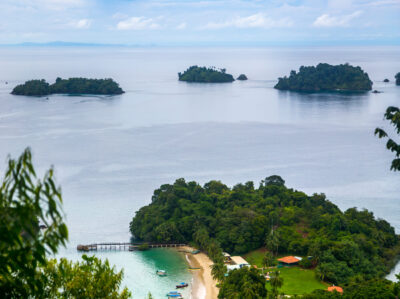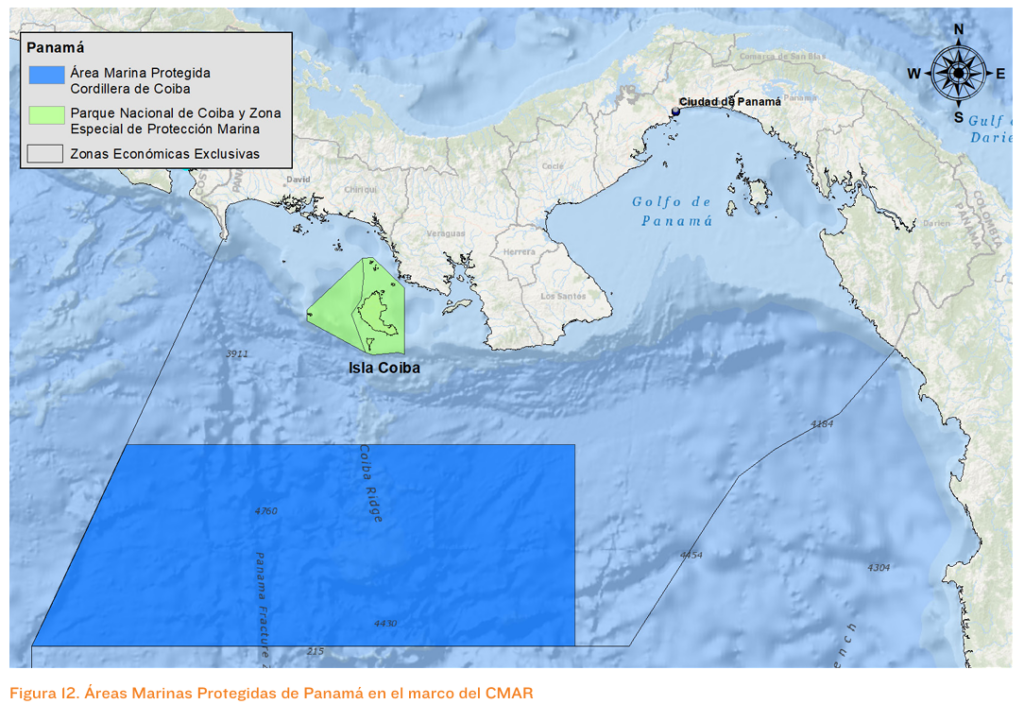
Panamanian authorities recently intercepted and seized 16 Panamanian-flagged commercial longline boats involved in illegal fishing within a marine protected area. The vessels were targeting yellow-fin tuna in the Cordillera de Coiba marine protected area, a vital region of the Eastern Tropical Pacific Marine Corridor. Spanning 67,908 square kilometers—almost the size of Panama’s entire land area—the Cordillera de Coiba marine protected area is a biodiversity hotspot and critical habitat for marine life.
The successful enforcement effort involved Panama’s Ministry of Environment, the Aquatic Resources Authority of Panama (ARAP), and the National Aeronaval Service (SENAN).
“This operational action is the largest capture against illegal fishing in the history of Panamanian marine protected areas,” the Ministry of the Environment said in a public statement.
Skylight, an advanced satellite monitoring platform introduced to Panama’s enforcement agencies by WildAid technical advisor Gregg Casad through an initiative with the Blue Nature Alliance and MigraMar, enhances interagency coordination with real-time vessel tracking, enabling authorities to detect and respond to illegal activities more effectively.
Powered by Maxar Technologies, Skylight provided Panamanian authorities with high-resolution satellite imagery to monitor and intercept vessels engaging in illegal fishing, even those attempting to evade detection by turning off their monitoring systems.
ARAP also utilizes THEMIS, a comprehensive fisheries monitoring and management platform that integrates diverse marine data to combat illegal fishing.
Using this cutting-edge technology, ARAP’s Fisheries Monitoring Center detected the illegal invasion. ARAP then proceeded to give the corresponding communications and alerts to the vessels to withdraw from the area, which they ignored. As the situation worsened, with more incidents occurring and more vessels illegally entering the area, a joint operation with ARAP, the Ministry of Environment and SENAN was launched to immediately stop illegal fishing activities.


WildAid is working in Panama with the CMAR Secretariat and the Ministry of Environment to enhance the protection of the Coiba National Park and Cordillera de Coiba marine protected areas. This is part of a coordinated effort including a project led by Fundación Pacifico with funding from Bezos Earth Fund with Re:wild and another project funded by Global Affairs Canada.
WildAid President John Baker and Latin America Project Manager Alonso Fraire were in Panama City to congratulate Minister Juan Carlos Navarro and Vice Minister Oscar Vallarino on this breakthrough achievement in marine protection and to discuss additional ways to strengthen our work together.
WildAid is honored to assist our partners in Panama, Costa Rica, Colombia, and Ecuador in strengthening the marine protection efforts throughout the Eastern Tropical Pacific Marine Corridor.


WildAid’s Work in the Eastern Tropical Pacific
WildAid has been working in the Eastern Tropical Pacific since 2010. In 2024, WildAid’s marine program announced a groundbreaking partnership with Global Affairs Canada to protect the vibrant Eastern Tropical Pacific Seascape. Over the next two years, this initiative will work to enhance the protection and sustainable use of marine resources across four countries in the region: Ecuador, Costa Rica, Colombia, and Panama. The project, Strengthening Marine Enforcement in the Eastern Tropical Pacific Seascape, will improve monitoring, control, and surveillance (MCS) capacities, bolster regional cooperation, and promote the role of both men and women in coastal communities in marine conservation efforts.
WildAid focuses on strengthening marine protection by working with governments, NGOs, and local communities to enforce marine protected areas and coastal fisheries. WildAid’s marine program has expanded to over 16 countries and won the prestigious Earthshot Prize in 2023 for its efforts to revive oceans.
About WildAid
WildAid inspires change and empowers the world to protect wildlife and vital habitats from critical threats, including illegal wildlife trafficking, climate change, and illegal fishing. WildAid delivers impact at scale in two distinct ways: 1) creating innovative communications campaigns that inspire millions of people in China, Southeast Asia, Africa, and the U.S. to protect endangered wildlife and reduce climate impacts, and 2) strengthening effective ocean enforcement of priority marine areas, including marine protected areas, coastal fisheries, coral reefs, and blue carbon habitats with government, NGO and community partners in 16 countries around the globe.
Stay in touch and get the latest WildAid updates.
SIGN UP